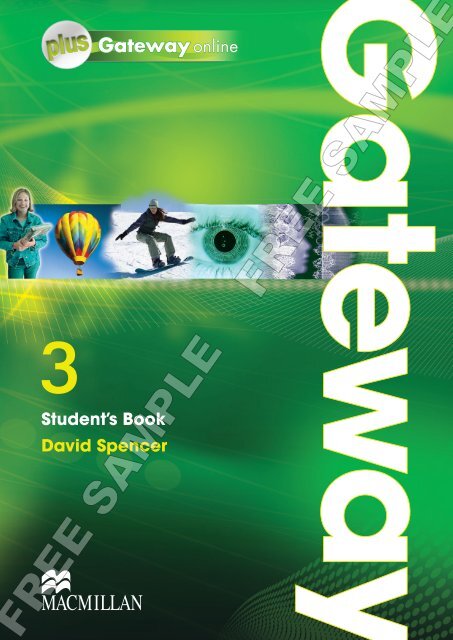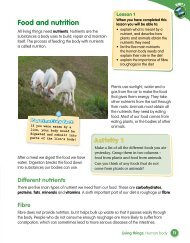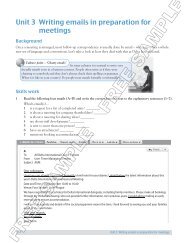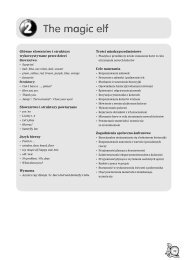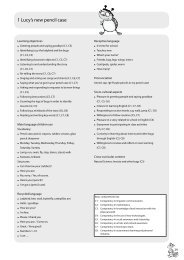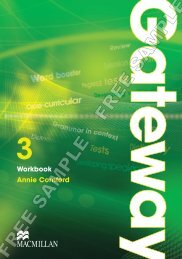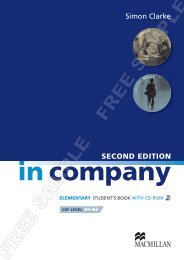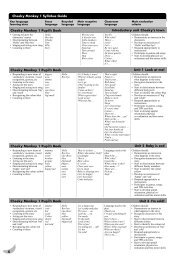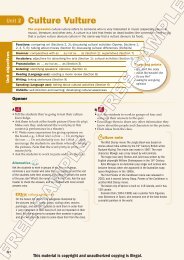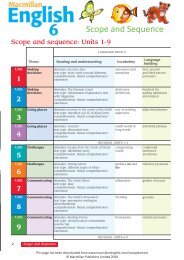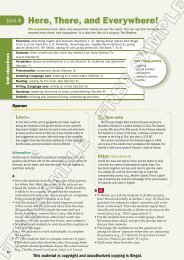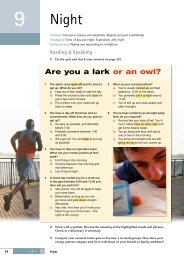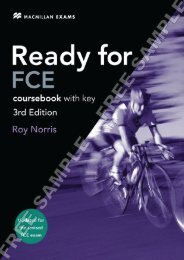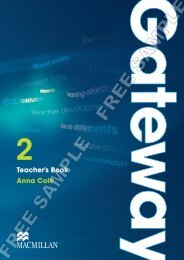Pobierz - Macmillan
Pobierz - Macmillan
Pobierz - Macmillan
- No tags were found...
Create successful ePaper yourself
Turn your PDF publications into a flip-book with our unique Google optimized e-Paper software.
Gateway onlineStudent’s BookDavid SpencerFREE SAMPLE FREE SAMPLE
Grammar in context98Grammar guideReported speech – Statements1a Match the reported sentences 1–9 with the direct sentences a–i.1 He said that some of his works took him a year to complete. a2 She told us that she knew nothing about modern art.b3 The artist said the work had needed delicate sculpting.c4 A friend told her that it might be valuable.d5 She said she was working on a new project.e6 He said he’d already painted lots of tiny pictures.f7 He told the reporter he could paint with a single rabbit hair. g8 He said he had to be very careful.h9 He said he would finish the work soon.i1b Choose the correct alternative.1 Nouns/Pronouns usually change when they go from direct toreported speech.2 The tenses of most verbs change/don’t change in reportedspeech.3 With say we need/don’t need to say the person we spoke to.2 How do these tenses change in reported speech? Look atthe Grammar reference for help.Direct speechReported speech1 present simple ➞ past simple2 present continuous ➞3 present perfect ➞4 past simple ➞5 will ➞6 can ➞7 may ➞8 must/have to ➞3 Complete the table with these words.a (week/month/year) ago here the day beforethe following (week/month/year) today tomorrowthe previous (week/month/year) that that nightDirect speechthis (1)(2) there(3) that dayyesterday (4)Reported speech(5) the next/following daytonight (6)next (week/month/year) (7)last (week/month/year) (8)(9) a (week/month/year) beforeUnit 8‘It may be valuable’‘Some of my works take me a year to complete.’‘I can paint with a single rabbit hair.’‘I know nothing about modern art.’‘I will finish the work soon.’‘The work needed delicate sculpting.’‘I’ve already painted lots of tiny pictures.’‘I’m working on a new project.’‘I have to be very careful.’4 With tell we need/don’t need to say the person wespoke to.5 With say and tell we always need/don’t always need touse that.Grammar REference str. 1044 Rewrite the sentences with told and the words in brackets.1 The musicians said they couldn’t play because they didn’tknow the music. (the audience)The musicians told the audience they couldn’ t playbecause they didn’ t know the music.2 You said you wanted to be a dancer. (me)3 Katie said she would never go on stage again. (her music teacher)4 She said the concert had been fantastic. (us)5 The artists said the exhibition was going to be a great success.(the reporters)6 The singer said that she was recording new songs in herstudio that day. (her fans)7 The artist said he had to stop moving. (the model)8 The conductor said they weren’t good enough to be in hisorchestra. (the two musicians)5 Now put the reported speech in 4 into direct speech.We can’ t play because we don’ t know the music.FREE SAMPLE FREE SAMPLE
6 Look at the statements made by famousartists. Write them in reported speech.1 Salvador Dali: ‘At the age of 6 I wanted to bea cook.’2 Grandma Moses: ‘Painting isn’t important.The important thing is keeping busy.’3 Damien Hirst: ‘I wanted to be stopped but noone will stop me.’4 Claude Monet: ‘My garden is my mostbeautiful masterpiece.’5 Pablo Picasso: ‘I don’t say everything, but Ipaint everything.’6 Vincent Van Gogh: ‘The only time I feel alive iswhen I’m painting.’7 Paul Klee: ‘Colour has taken possession of me.’8 Andy Warhol: ‘In the future everyone will befamous for fifteen minutes.’7a Speaking Write down things that your friendsor family have said or told you recently.7b Tell your partner the things that peoplehave said. Can your partner guess who saidthese things?Someone told me that Ihad to get my hair cut.Yes!Was it your dad?Developing vocabularyAdjectives ending in -ing and -ed1 Look at the two sentences.1 The owners were amazed to get their painting back.2 It was amazing that somebody had returned the painting tothe owners.The words in bold are adjectives. Which adjective describeshow somebody feels? Which adjective explains why theyfeel this way?2 Look at these adjectives. Which are positive (+) and whichare negative (–)?amazed bored confused disappointeddisgusted embarrassed excited frightenedinspired interested relaxed surprisedtired uninspired3a Pronunciation Look at the adjectives in 2 again. In whichadjectives do we pronounce -ed as /ɪd/?3b 2.16 Listen and check your answers. Which letter comesbefore -ed in all those adjectives?3c Practise saying the adjectives in 2.4 Choose the correct alternative.1 Artists are often inspiring/inspired by nature.2 Yuck! This soup is disgusting/disgusted.3 Working all day and studying at night is tiring/tired.4 Many people are confusing/confused when they seemodern art.5 When artists explain their own work, it can be a bitboring/bored.6 I would be embarrassing/embarrassed if I had to standon a stage and sing.7 In my opinion, that band’s new CD is very disappointing/disappointed – the songs are awful.8 We’re really exciting/excited about going to see that playnext week.5a Speaking Prepare things to say about the topics below.1 Two people you think are inspiring.2 Two activities you think are boring.3 A moment in your life when you were very surprised.4 A time when something embarrassing happened to you.5 The most exciting thing you have ever done.6 A time when you were frightened.5b Talk about the topics with a partner. Ask questions to keepthe conversation going.5c Tell the class what your partner told you about one ofthe topics.Dana told me that she is inspired by her sister.Her sister works for a charity that helpschildren with family problems …FREE SAMPLE FREE SAMPLEStosowanie struktur leksykalno-gramatycznych Słowotwórstwo • Mówienie Rozmowa wstępnaUnit 899
4 Complete the reported questions.1 ‘Did you like the exhibition?’She asked him2 ‘Who is your favourite artist?’She wanted to know3 ‘Do you often visit art galleries?’She asked him4 ‘Will you recommend the exhibition to other people?’She asked him5 ‘Why did you decide to see the exhibition?’She wanted to know6 ‘Are you going to buy anything in the shop?’She wanted to know7 ‘Have you ever bought an original painting?’She askedGrammar guideReported speech – Commands5 Look at the direct and reported commands andanswer the questions.1 ‘Be good!’2 The teachers told the children to be good.3 ‘Please don’t touch the paintings!’4 They asked the children not to touch the paintings.a Which verbs can we use to report commands?b Do we change the tense of the verb from thedirect command or use the infinitive in thereported command?c Where does not come in reported commands thatare negative?6 Report these commands.Grammar Reference str. 1041 ‘Pay attention!’ the teacher told the class.The teacher2 ‘Give me your tickets, please,’ the man at the entranceasked them.The man at the entrance3 ‘Don’t shout!’ his mum told him.His mum4 ‘Please don’t take photos inside the museum,’ the guideasked the visitors.The guide5 ‘Don’t come home late!’ Dad told me.Dad6 ‘Use a bigger brush,’ the art teacher told Jake.The art teacher7 ‘Please write a description of the painting for homework,’the teacher asked the students.The teacher7 Speaking Play in two teams. Take it in turns to try andremember things that teachers asked or told you to do thisweek. You get one point for each correct sentence.Our English teacher asked us to do this exercise.She told us not to speakin our own language.FREE SAMPLE FREE SAMPLEStosowanie struktur leksykalno-gramatycznych Układanie fragmentów zdań z podanych elementów leksykalnychUnit 8101
Developing writing An announcement1 Look at the school announcement and find this information.1 What is the event?2 What exactly do the organisers want?3 When do they want it?4 Can you win anything if you participate?5 When is the event?6 Who can be in the event?7 What should you do if you want to know more?2 Put the questions in 1 in the order that the answersappear in the announcement.3 Look at the advice in the Writing Bank. Does theannouncement in 1 follow the advice?Writing BankUseful advice for writing announcements• Use short, clear sentences.• Have a slogan or a title which attracts attention.• Make the announcement easy to understand andinteresting to read.• Include all the practical information and details that areader needs to know.4 Work with a partner. Choose one of these events below.1 A school play2 A school magazine3 A school concertComplete a diagram with information that you wouldneed to include in an announcement for the event.Practice makes perfect5 Look at the task and write an announcement followingthe advice in the Writing Bank.Write an announcement to ask people toparticipate in a school play, a school magazine,or a school concert. Include information about:• what the event is• what you need• when you need it.Study SkiLLSWho are you writing to in this task? Why is it important toknow who you are writing to? STUDY SKILLS str. 162FREE SAMPLE FREE SAMPLEWypowiedź pisemna OgłoszenieUnit 8103
Gateway to matura Unit 8Stosowanie struktur leksykalno--gramatycznych – parafraza zdańTIP In this section of the exam you must repeat the context andmeaning of the original sentence in a new sentence.1. Think of other ways of saying the questions/responsesbelow.How are you? …………………………………………………………………………………………………………………………………What’s new? ……………………………………………………………………………………………………………………………………It’s nice to see you. ……………………………………………………………………………………………………………………………2. Complete the gaps in the sentences with the words fromthe box. Then match the sentences from columns A andB which have a similar meaning.TIP While doing key word transformations, make sure that the twosentences mean the same thing. For example, if the sentence that is beingtransformed has names in it, the answer will need to have them, too.drives went giving was if thinkingmakes unless painted said should inplanning since ought to favourite doinground told like106 Unit 8A1. She …………. me crazy. a. She’s ……………a gigtonight.2. Leonardo Da Vinci………… the Mona Lisa.3. Tom will see the Mona Lisa………… he visits Paris.4. I’m ……………. to go to arock concert on Saturday.5. I haven’t been to a rockconcert ………… lastSaturday.6. You …………. practiseharder if you want to playrock music well.7. She’s ………… a concerttonight.Bb. Come ……….. if you havetime tonight.c. She …………. me mad.d. Rock is my ………….. kindof music.e. The last time I ……….. toa rock concert was lastSaturday.f. I’m ……………. of going to arock concert on Saturday.g. The Mona Lisa ………..painted by Leonardo DaVinci.8. I really ……… rock music. h. Tom ………. me that he hadseen the Mona Lisa whenhe’d been to Paris.9. “I saw the Mona Lisawhen I was in Paris”……… Tom.10. Drop ……….. if you arefree tonight.i. Tom won’t see the Mona Lisa……….. he visits Paris.j. You ………….. to practiseharder if you want to playrock music well.1 2 3 4 5 6 7 8 9 10c3. Match the pairs of sentences from 2 with the languageareas 1–10 they represent.TIP Remember that this part of the exam is a test of …………… as wellas …………… Thus, you are likely to be tested on e.g. collocationsas well as reported speech.1. collocations: …………………2. phrasal verbs: …………………3. fixed expressions: …………………4. personal pronoun inversion: …………………5. shifting tenses: …………………6. changing gerund to infinitive or vice versa: …………………7. passive voice: …………………8. reported speech: …………………9. conditional sentences: …………………10. modal verbs: …………………4. Read the pairs of sentences. Some of them containmistakes. Correct any mistakes that you find.TIP Circle the correct option in italics.The word given must/doesn’t have to be included in the answer, and can/cannot be changed in any way.1. They’re doing a gig in Leeds tonight. (GIVING)They’ll be giving a concert in Leeds tonight.2. I’m glad you’ve dropped in – I haven’t seen you for ages!(ROUND)I’m glad you’ve come round – I haven’t seen you for ages!3. I haven’t been to the theatre for a year. (SINCE)It’s been a year since I last went to the theatre.4. She ought to take some painting classes. (SHOULD)She should to take some painting classes.5. We’ll win the competition if we are lucky. (UNLESS)We’ll win the competition unless we are lucky.Zadanie maturalne5. Wykorzystując wyrazy podane w nawiasach, uzupełnijkażde zdanie, tak aby zachować znaczenie zdaniawyjściowego. Wymagana jest pełna poprawnośćortograficzna i gramatyczna wpisywanych fragmentówzdań.Uwaga: nie zmieniaj formy podanych wyrazów.Za każde poprawne rozwiązanie otrzymasz 0,5 punktu.1. This book really disappointed me. (DISAPPOINTING)I found ………………………………2. He is making this sculpture of stone and wood. (MADE)This sculpture ……………………… of stone and wood.3. I’m sure she isn’t in the gallery right now. (CAN’T)She …………………………… right now.4. “Have you ever been to the opera?” – asked my musicteacher. (WHETHER)My music teacher wanted to know ………………………to the opera or not.5. My neighbour is going to throw away his old piano. (RID)My neighbour is going to ……………………… his oldpiano.FREE SAMPLE FREE SAMPLE
Wordlist Unit 8(adj) = adjective – przymiotnik(adv) = adverb – przysłówek(conj) = conjunction – spójnik(det) = determiner – określnik (np.: a, an, the, that itp.)(n) = noun – rzeczownik= słowo bardzo często używane = często używane = dosyć często używaneKultura – twórcy i ich dziełaabstract painting (n) /ˌæbstrækt ˈpeɪntɪŋ/ malarstwo abstrakcyjneactor (n) ★★★ /ˈaektə/ aktorartist (n) ★★★ /ˈɑːtɪst/ artystacomposer (n) ★★ /kəmˈpəʊzə/ kompozytorconductor (n) ★ /kənˈdʌktə/ dyrygentdancer (n) ★★ /ˈdɑːnsə(r)/ tancerzdrawing (n) ★★★ /ˈdrɔːɪŋ/ rysunek, rysowanieexhibition (n) ★★★ /ˌeksɪˈbɪʃ(ə)n/ wystawagig (n) ★ /gɪg/ występlyrics (n) /ˈlɪrɪks/ tekst piosenkimasterpiece (n) ★ /ˈmɑːstəˌpiːs/ arcydziełomusician (n) ★★ /mjuˈzɪʃ(ə)n/ muzykpainter (n) ★★ /ˈpeɪntə/ malarzperformance (n) ★★★ /pəˈfɔːməns/ przedstawienieperformer (n) ★ /pərˈfɔːmə/ artysta, wykonawcaplay (n/v) ★★★/★★★ /pleɪ/ gra/grać(self)-portrait (n) ★★ (/self/) /ˈpɔːtrɪt/ (auto-)portretsketch (n/v) ★/★ /sketʃ/ szkic, szkicowaćsculptor (n) /ˈskʌlptə/ rzeźbiarzsculpture (n) ★★ /ˈskʌlptʃə/ rzeźbasinger-songwriter (n) /ˌsɪŋəˈsɒŋraɪtə/ piosenkarz-autor tekstówpiosenekInneamazed (adj) /əˈmeɪzd/ zaskoczonyamazing (adj) ★★ /əˈmeɪzɪŋ/ zdumiewającyaudience (n) ★★★ /ˈɔːdiəns/ publicznośćbagpipes (n) /ˈbægˌpaɪps/ dudybehave (v) ★★ /bɪˈheɪv/ zachowywać sięBodhràn (n) /ˈbɒdrən/ irlandzki bębenobręczowybored (adj) ★★ /bɔːd/ znudzonyboring (adj) ★★ /ˈbɔːrɪŋ/ nudnybottomless (adj) /ˈbɒtəmləs/ bez dnabrush (n) ★★ /brʌʃ/ pędzelcandy (n) /ˈkændi/ cukierekcast (n/v) ★/★★★ /kɑːst/ obsada/obsadzaćchieftain (n) /ˈtʃiːftən/ wódz, hersztcoin (n) ★★ /kɔɪn/ monetaconfused (adj) ★★ /kənˈfjuːzd/ zdezorientowanyconfusing (adj) ★ /kənˈfjuːzɪŋ/ zagmatwanycrack (n) ★★ /kræk/ szczelinadeep (adj) ★★★ /diːp/ głębokidelicate (adj) ★★ /ˈdelɪkət/ delikatnydiameter (n) ★ /daɪˈaemɪtə/ średnicadisappointed (adj) ★ /ˌdɪsəˈpɔɪntɪd/ rozczarowanydisappointing (adj) ★ /ˌdɪsəˈpɔɪntɪŋ/ rozczarowującydisgusted (adj) /dɪsˈgʌstɪd/ zniesmaczonydisgusting (adj) ★ /dɪsˈgʌstɪŋ/ odrażającyembarrassed (adj) ★ /ɪmˈbaerəst/ zakłopotanyembarrassing (adj) ★ /ɪmˈbaerəsɪŋ/ krępującyemerald (n) /ˈem(ə)rəld/ szmaragdemigrate (v) /ˈemɪgreɪt/ emigrowaćexcited (adj) ★★ /ɪkˈsaɪtɪd/ podekscytowanyexciting (adj) ★★ /ɪkˈsaɪtɪŋ/ ekscytującyfrightened (adj) ★ /ˈfraɪt(ə)nd/ przerażony(phr) = phrase – wyrażenie(prep) = preposition – przyimek(pron) = pronoun – zaimek(v) = verb – czasownikfrightening (adj) ★ /ˈfraɪt(ə)nɪŋ/ przerażającygallery (n) ★★ /ˈgaeləri/ galeriainspired (adj) /ɪnˈspaɪəd/ zainspirowanyinspiring (adj) /ɪnˈspaɪərɪŋ/ inspirującyinstallation (n) ★★ /ˌɪnstəˈleɪʃ(ə)n/ instalacjainterested (adj) ★★★ /ˈɪntrəstɪd/ zainteresowanyinteresting (adj) ★★★ /ˈɪntrəstɪŋ/ interesującyintricate (adj) /ˈɪntrɪkət/ trudny, skomplikowanyisle (n) /aɪl/ wyspalandscape (n) ★★ /ˈlæn(d)ˌskeɪp/ krajobrazlighting (n) ★★ /ˈlaɪtɪŋ/ oświetlenieorchestra (n) ★★ /ˈɔːkɪstrə/ orkiestrapanic (v) ★ /ˈpaenɪk/ panikowaćpile (n) ★★ /paɪl/ stertarecord (n) ★★★ /ˈrekɔː(r)d/ rekordrecord (v) ★★★ /rɪˈkɔː(r)d/ nagrywaćrelaxed (adj) ★ /rɪˈlækst/ zrelaksowany, wypoczętyrelaxing (adj) /rɪˈlaeksɪŋ/ relaksującyrestore (v) ★★★ /rɪˈstɔː/ odnawiać, restaurowaćrhythm (n) ★★ /ˈrɪðəm/ rytmrubbish (n) ★★ /ˈrʌbɪʃ/ śmiecisingle (= just one) /ˈsɪŋg(ə)l/pojedynczy(adj) ★★★slogan (n) ★ /ˈsləʊgən/ slogansplendid (adj) ★★ /ˈsplendɪd/ wspaniałystage (n/v) ★★★/- /steɪdʒ/ scena, występowaćna sceniestill life (n) /ˌstɪl ˈlaɪf/ martwa naturastudio (n) ★★★ /ˈstjuːdiəʊ/ studiosurprised (adj) ★★★ /səˈpraɪzd/ zaskoczonysurprising (adj) ★★★ /səˈpraɪzɪŋ/ zaskakującytap (n) ★★ /tæp/ klepnięciethrow away (v) /ˌθrəʊ əˈweɪ/ wyrzucaćtired (adj) ★★★ /ˈtaɪəd/ zmęczonytiring (adj) /ˈtaɪərɪŋ/ męczącyUilleann pipes (n) /wiːlən ˈpaɪps/ dudy irlandzkieuninspired (adj) /ˌʌnɪnˈspaɪəd/ banalnyuninspiring (adj) /ʌnɪnˈspaɪərɪŋ/ bez polotu, przeciętnyvaluable (adj) ★★★ /ˈvaeljʊb(ə)l/ wartościowyvoice (n) ★★★ /vɔɪs/ głoswaste (n) ★★★ /weɪst/ odpadywatercolour (n) /ˈwɔːtəˌkʌlə/ akwarelawide (adj) ★★★ /waɪd/ szerokiworth (adj) (= it’s worthX pounds) ★★★/wɜːθ/wartycreep (v) ★ /kriːp/ skradać się, czołgaćfiddle (= violin) (n) /ˈfɪd(ə)l/ skrzypki, skrzypceflood (n) ★★ /flʌd/ powódźharp (n) /hɑːp/ harfaplague (n) /pleɪg/ plagarenew (v) ★★ /rɪˈnjuː/ odświeżyć, odnowićscream (n) ★ /skriːm/ krzykstab (v) ★ /stæb/ dźgaćwhisper (n) ★ /ˈwɪspə/ szeptFREE SAMPLE FREE SAMPLEUnit 8107


